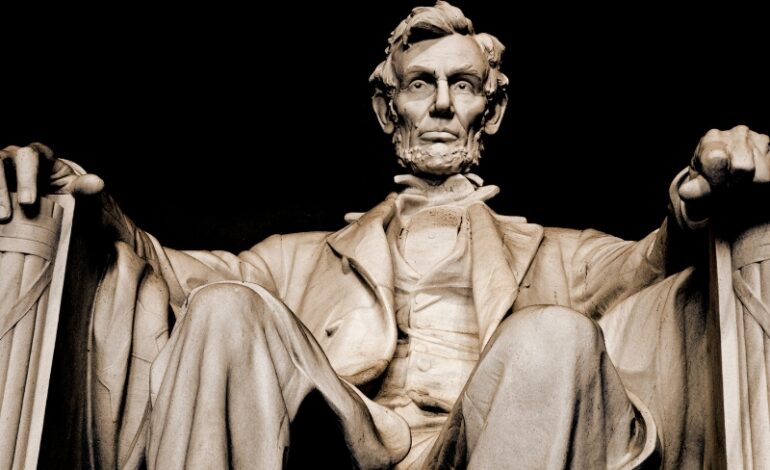The Compassionate Crusade of Abraham Lincoln

From Humble Beginnings to the Halls of Power

Abraham Lincoln’s story begins in the rugged wilderness of Kentucky, where he was born into a poor family. His early life was filled with adversity, including the loss of his mother at a young age and the challenges of frontier life. Yet, these hardships forged a resilience and determination in Lincoln that would define his character.
Despite his modest upbringing, Lincoln’s ambition and intellect were evident. He moved with his family to Indiana and later to Illinois, where he set out to educate himself. His voracious reading and ability to learn quickly allowed him to overcome the lack of formal education and set the stage for his future achievements.
Self-Education and Legal Prowess
Lincoln’s pursuit of knowledge led him to the field of law, a profession that would become the foundation of his career. He borrowed books on law and studied tirelessly, eventually earning his license to practice. His legal career in Springfield, Illinois, was marked by a reputation for honesty and a sharp wit, earning him the nickname “Honest Abe.”
As a lawyer, Lincoln honed his skills in argumentation and public speaking. These abilities served him well in his political pursuits, allowing him to articulate his views with clarity and conviction. His legal practice also provided him with insights into the complexities of society and the importance of the rule of law.
Political Ascent and the National Stage

Lincoln’s political career was initially local, serving in the Illinois State Legislature. His early political experiences shaped his views on slavery and governance, and he became known for his eloquent speeches and moderate stance on various issues. His time in state politics laid the groundwork for his future leadership.
In 1846, Lincoln was elected to the U.S. House of Representatives. Though his term was short, it was significant, as he spoke out against the Mexican-American War and began to establish himself as a national figure. His return to politics in the 1850s was driven by his opposition to the Kansas-Nebraska Act and the spread of slavery. His words, “government of the people, by the people, for the people,” continue to resonate as a defining statement of American democracy
The Great Debates and Presidential Victory
The Lincoln-Douglas debates of 1858 were a defining moment in Lincoln’s political life. His debates with Senator Stephen Douglas brought his views on slavery and union to a broader audience. Though he lost the Senate race, his performance made him a leading figure in the newly formed Republican Party.
Lincoln’s rise to the presidency was marked by a divided nation on the brink of war. His election in 1860 was a catalyst for the secession of Southern states, but it also demonstrated the power of his message and the trust the people placed in his leadership. His commitment to preserving the Union was about to be tested like never before.
Leadership in Turmoil and the Emancipation Proclamation

The Civil War presented challenges that few leaders could navigate successfully. Lincoln’s presidency during this tumultuous time was marked by his unwavering commitment to keeping the United States whole. He faced criticism from all sides, yet he remained steadfast in his principles and his vision for the nation.
The Emancipation Proclamation was a bold move by Lincoln, one that changed the course of the war and the nation. It not only freed enslaved individuals in the Confederacy but also redefined the purpose of the war. Lincoln’s decision was a reflection of his deep moral convictions and his belief in the Declaration of Independence’s promise that all men are created equal.
The Gettysburg Address and Redefining Democracy
The Gettysburg Address is one of Lincoln’s most famous speeches and a cornerstone of American history. In just a few minutes, he eloquently expressed the grief of a nation and the hope for a new birth of freedom. His words captured the essence of the American experiment and the sacrifices made to preserve it.
This speech also served to remind the nation of its founding principles and the ongoing struggle to achieve them. Lincoln’s address at Gettysburg was a call to action, urging the living to dedicate themselves to the unfinished work of those who fought and died for the nation’s unity and freedom.
Lincoln’s Life Cut Short and a Lasting Impact

Lincoln’s assassination was a national tragedy that robbed the United States of a leader at a critical moment. His death came just as the Civil War was ending, and the difficult work of rebuilding the nation was about to begin. The loss of his guidance during Reconstruction had long-lasting effects on the country.
Despite his untimely death, Lincoln’s legacy endured. He became a symbol of American ideals and the struggle for justice. His leadership during one of the nation’s darkest hours left an indelible mark on history and continues to inspire future generations.








![Top 5 Most Powerful Mysterious Creatures Of All Time[Updated 2024]](https://newsdailybeats.com/wp-content/uploads/2024/06/mystery-creatures-1.jpg)
